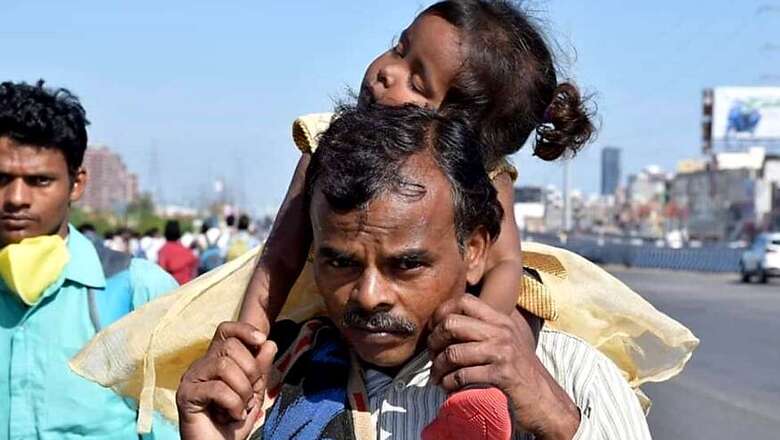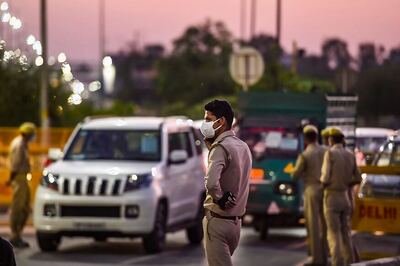
views
Even with the relaxation of inter-state travel rules and the introduction of trains for migrant workers, several people are under extreme distress as they fail to access government relief schemes and have almost no savings.
A huge number of migrant workers were stranded in different cities across the country as the lockdown was announced without any relief for those who were out of work owing to the curfew implemented to contain the spread of COVID-19.
And as the states start running special trains to bring back the migrant labourers, a majority of them, who went to different states to earn better living, are forced to return home hungry and with no money at all.
As part of a survey carried out by the Stranded Workers Action Network (SWAN), a network of researchers, spoke to over 11,000 migrants from Maharashtra, Delhi, Karnataka, Uttar Pradesh, Bihar, West Bengal, and Jharkhand, from March 27 after the lockdown came into place on March 25.
The data, updated till April 13, revealed that close to 96 percent of migrant workers had not received rations from the government, while another 70 percent had not received any cooked food.
Despite directives on daily wages by the government, 89 percent had not received any payment from their employers during the lockdown. Most of them have been paid only till March 22 and were asked to return only after the lockdown is lifted.
A migrant exodus was visible across major cities in India, such as New Delhi and Mumbai, while also dealing with misinformation and little help from the administration as many set out to their native places on foot.
Temporary shelter camps faced with social unrest and some have been set ablaze owing to the lack of basic facilities and shortage of food. The workers staying back in their homes are now running out of ration and money.
Can’t Access Rations, Cooked Meals
According to ‘21 days & Counting’ by SWAN, 50 percent of the workers had additional ration that would last for less than a day.
“I earn Rs 400 every day and I have a family of six to feed. We will run out of food and money in a few days. I know the risk of coronavirus, but I can’t see my children hungry,” said Ramesh Kumar, a daily wage labourer from Banda in Uttar Pradesh.
Lack of cash and ration have forced these workers to eat scarcely. A group of 240 workers from Bengaluru told SWAN that they would eat only one meal a day, to save up on what’s left.
Another group of 1,161 workers from Uttar Pradesh said that none of them received any rations from the state government.
“I am sitting and not doing any work now. The local administration is not making any provision for food and ration. We are facing hard times,” said Amarnath, another labourer from Ghazipur in Uttar Pradesh.
State governments, gurdwaras, temples, mosques and other organisations have been able to provide cooked meals to the workers. However, there are state-level variations with respect to access to cooked meals, the report found.
While 80 oercent of workers in Karnataka have not had access to cooked meals, the numbers in Punjab are lower at 32 percent. This is on account of a large number of gurdwaras in the state providing cooked meals to the needy.
Long lines, overcrowding and insufficient quantity of cooked food in government feeding centres have added to their distress.
Suresh (who gave only his first name), a construction worker from Bihar currently working in Delhi, said, “The lines are long and food runs out by the time it is our turn.”
Bhagyalakshmi, a widow with three children from Tamil Nadu, is stranded in Bengaluru. She said, “I am unable to access the Indira Canteen as it is extremely crowded.”
As on April 8, a little more than 1 percent of the workers had access to ration from the government and this number increased to a mere 4 percent by April 13.
The percentage of workers who received cooked meals from either the government or other organisations, reduced from 80 percent in the second week of lockdown to around 70 percent in the third week of lockdown.
Lack of Money
To prevent migration of the distressed due to the lockdown, the Ministry of Home Affairs issued an order on March 29 stating that employers should pay the workers full wages and that homeowners shouldn’t charge rent from stranded workers. However, only a few people have been paid.
Among the surveyed, only 9 percent of the migrant workers had been paid, while some who have been given ration by employers have been told that the money for the rations will be deducted. Some workers have also been threatened not to complain.
Speaking to SWAN, Rambali Ram, and another family (eight members in total) were working for Hindalco’s plant at Singrauli in Madhya Pradesh, said that while they have been given 5 kg of wheat by a local organisation, they have no cash for grinding the wheat to make it into flour or to buy essentials like salt and oil.
Salim Sheikh, a small-time contractor in Solapur, Maharashtra, was only able to arrange for grains for 50 of his workers, adding that he had not been able to pay the labour wages as his business has taken a severe hit due to the lockdown.
Upendra Rushi, a daily wage labourer from Bihar stranded in Surat, Gujarat, with around 40 others, said, “Our employer still compels us to work saying if you don’t work you won’t get food. Food is offered only once.”
(The author is a Bangalore-based freelance writer and a member of 101Reporters.com)


















Comments
0 comment